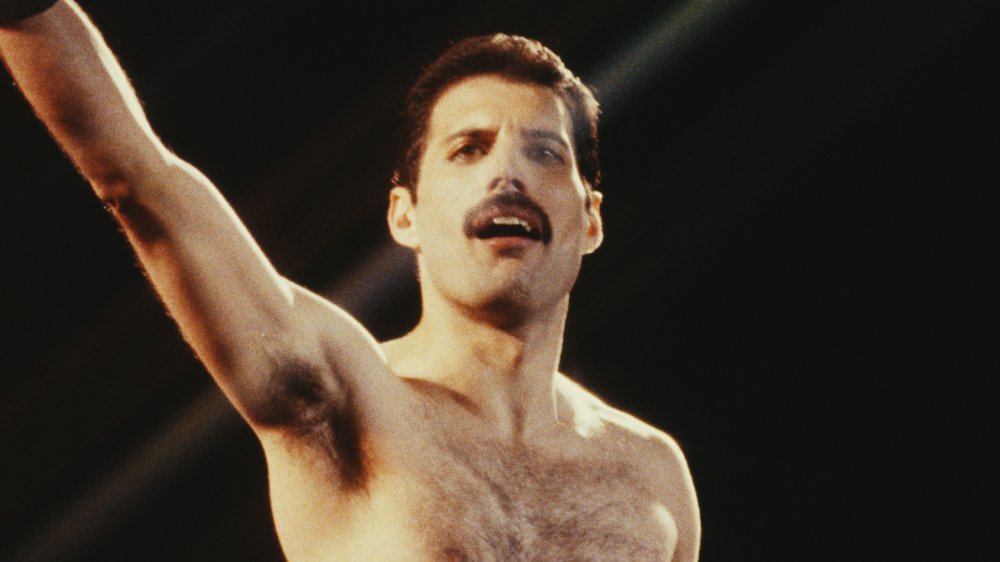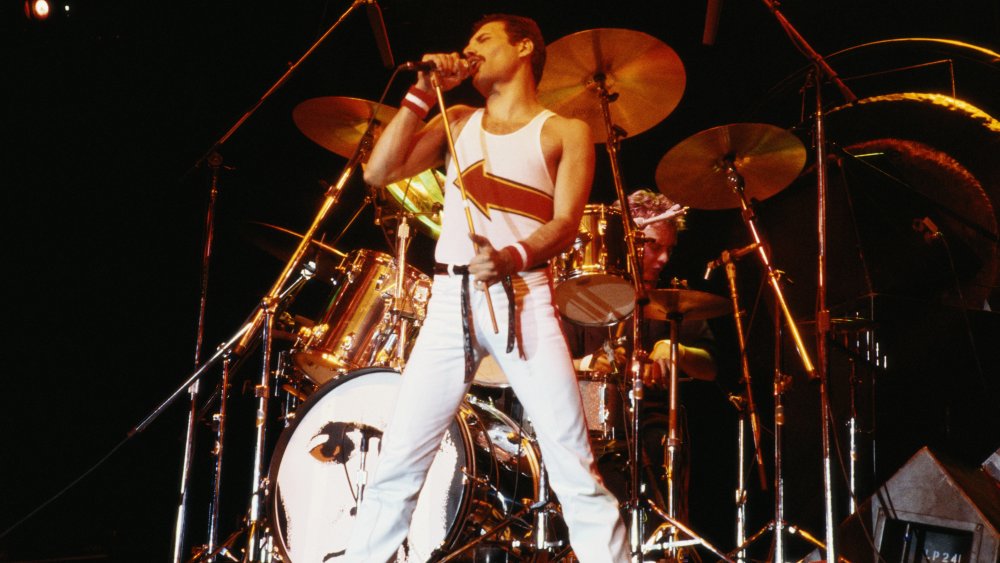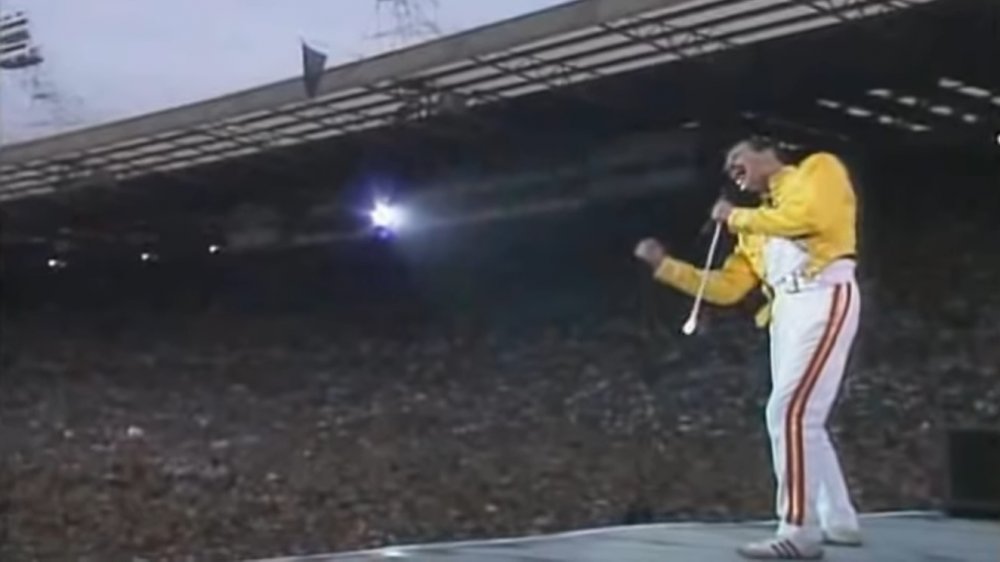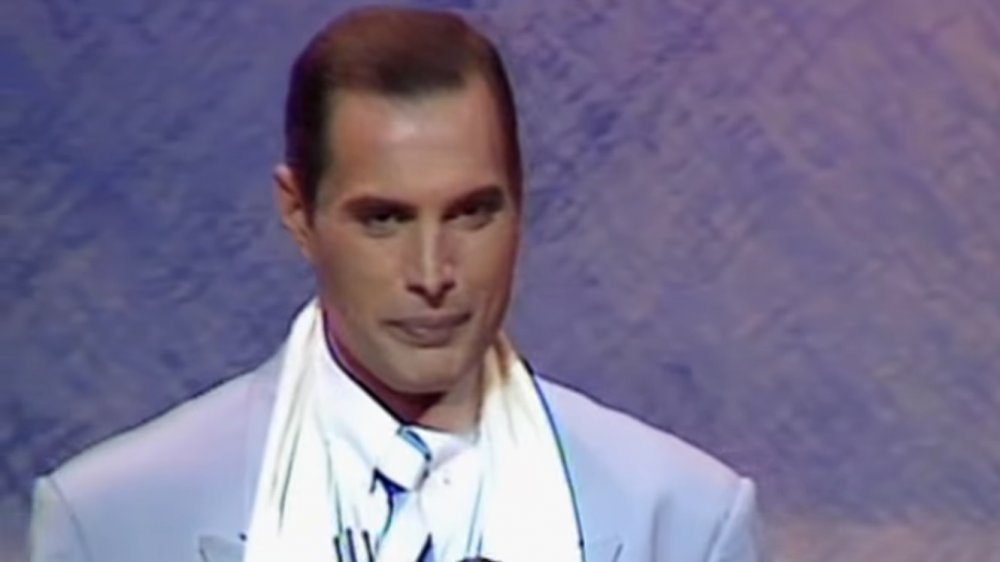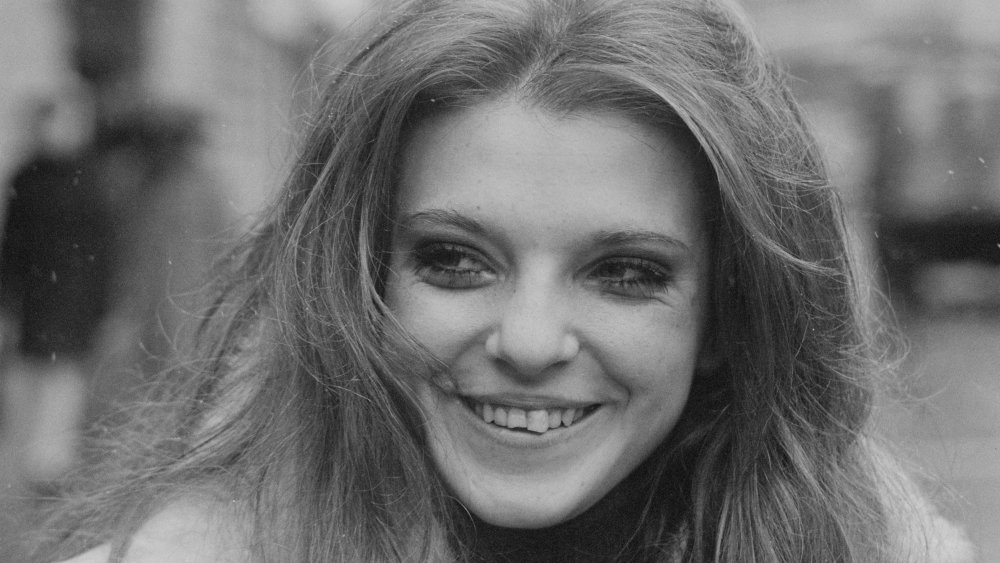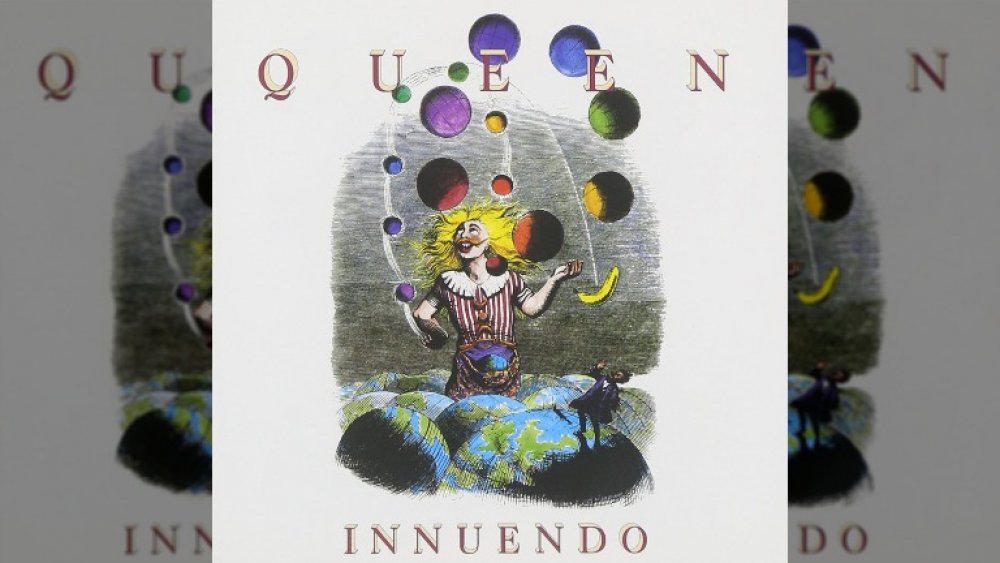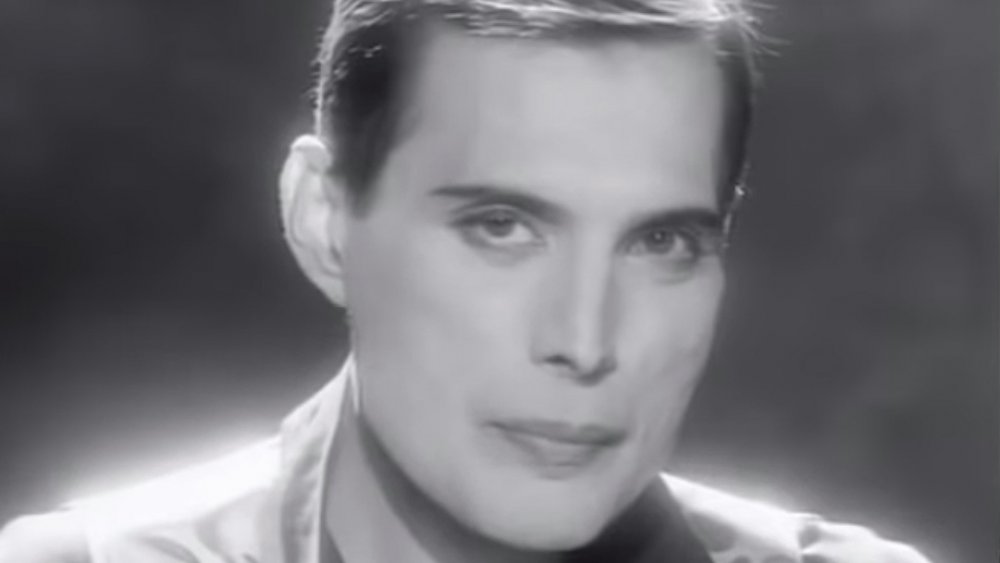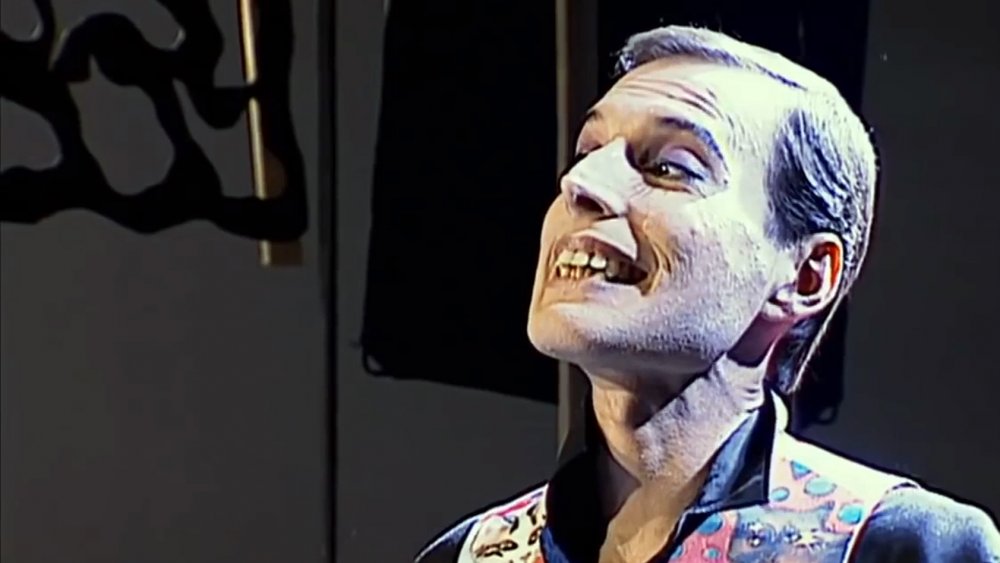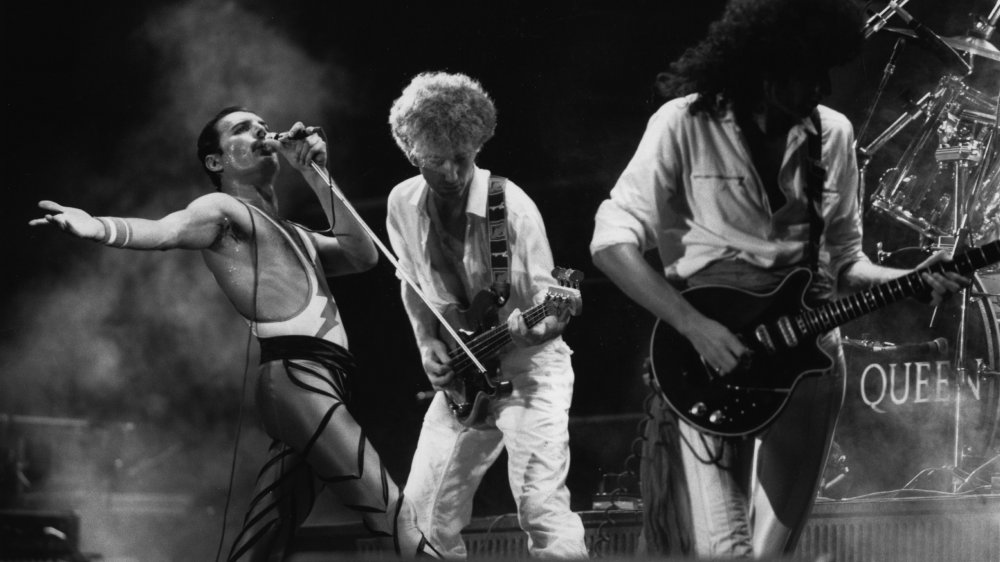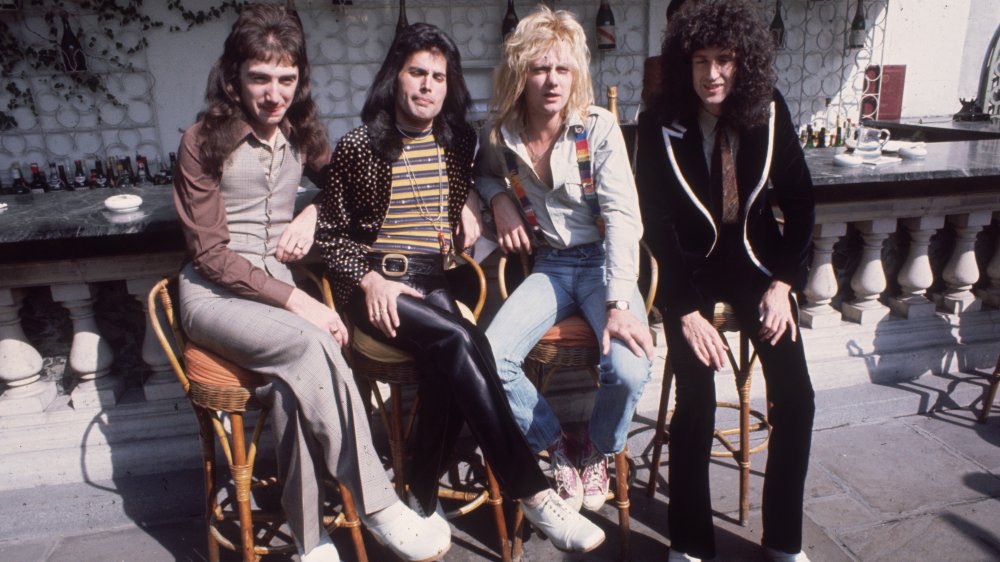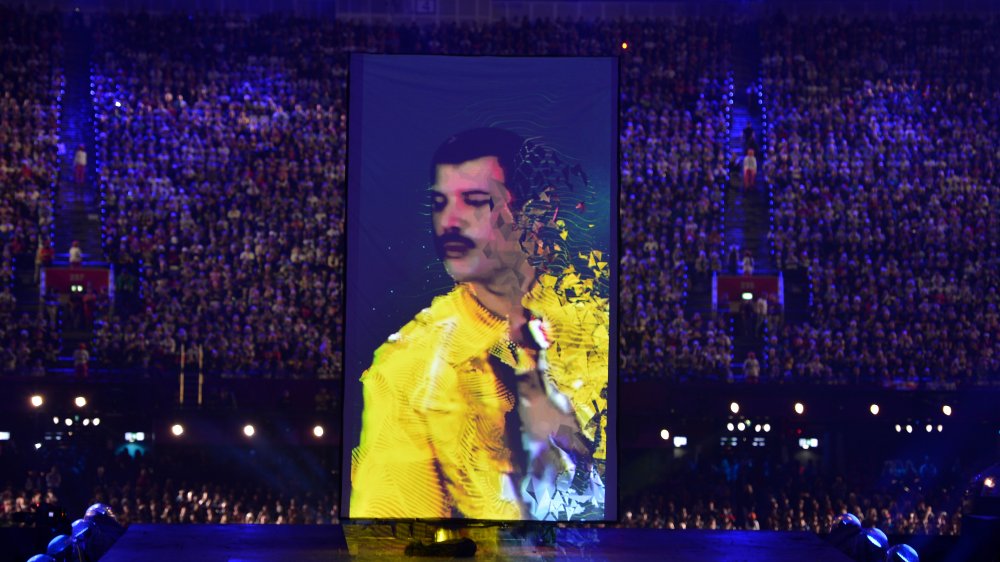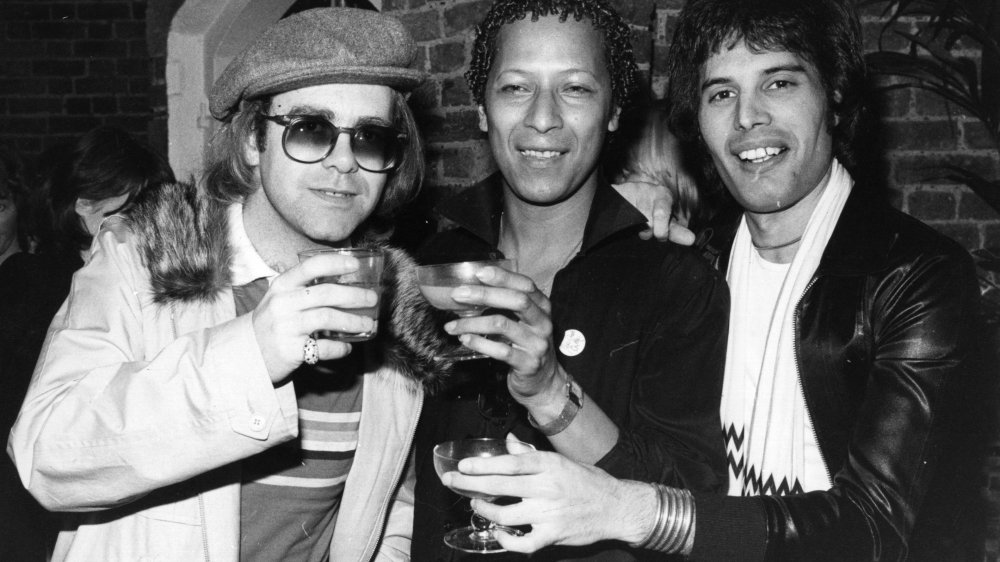What The Final 12 Months Of Freddie Mercury's Life Were Like
Freddie Mercury was born in Tanzania, schooled in India, and moved to the UK. But whatever his roots may be, Mercury became and remains an international superstar. As the man once said, "I am not going to be a rock star. I am going to be a legend." And yeah, he totally fulfilled his promise, but while he lived like a legend, he died an enigma. Mercury passed away far too early, at the age of 45. Once he was diagnosed with AIDS, it was a clear-cut death sentence.
But what were his last months like? Were they empty of comfort and hope? Or were they filled with laugh, laughter, and music? How does a dying rock star spend his last days? Well, let's delve into the life of Queen's famous frontman and see what was happening in his twilight moments. From the media frenzy to his final songs, here's what the final 12 months of Freddie Mercury's tragic life were like.
Freddie Mercury's health was continuously questioned
In 1980, AIDS was a mysterious killer. Most people didn't really understand how it was contracted, and since it was first noticed in gay men, it became labeled as a "gay cancer." As a result, AIDS became a lightning rod for homophobia, so it's no surprise that Freddie Mercury decided to reveal his diagnosis to a select few. His closest friends knew, but the rest of the world and media could only speculate.
That said, the world hounded Freddie. According to People, rumors of the singer having undergone an AIDS/HIV test emerged in 1986, and Mercury was officially diagnosed a year later. But when asked about it, Mercury denied that he'd tested positive for HIV. Of course, his secret was his to share, and Mercury didn't give an inch. Still, the media was rife with innuendos and mud-slinging headlines as they questioned his lifestyle and his sexual preferences. But during the last months of his life, Mercury locked them all out. After all, he wanted to make as much music as he could before the reaper came calling.
He never performed in the last months of his life
Even before receiving his official diagnosis, Freddie Mercury knew things were coming to an end. In fact, according to Queen's guitarist Brian May (via Ultimate Classic Rock), there were worrying signs back in 1986. As May explained, Mercury got into an argument with John Deacon, Queen's bassist, and during the fight, Mercury said, "I can't be doing this forever. This is probably my last time."
Tragically, those words proved true. There was no performance by Mercury during his last months, and perhaps this saddened the rock star the most, even more than his fans. Queen's last tour with the original lineup was in 1986. Known as the Magic Tour, this was the tour where Mercury famously "day-o-ed" to a crowd of over 125,000 at Wembley Stadium in July. And it all ended on August 9 at Knebworth Park. This would be the last time that Mercury electrified the stage, and when it as all done, Mercury bid adieu to his audience with, "Good night and sweet dreams." And just like that, it was all over.
Freddie Mercury's last public appearance
During the last months of his life, Freddie Mercury rarely ventured out in public. The press tried to get pictures of him, but he tended to stay indoors most of the time. From sickly to gaunt, Freddie looked near death in a September 1991 picture published by the tabloid, The Mirror. But he preferred to keep his illness and his suffering to himself.
According to Ultimate Classic Rock, Mercury made his last public appearance at the 1990 Brit Awards in February. Dressed in a powder blue suit, he looked subdued for a man who was a fireball on stage. Brian May did the talking as he thanked everyone for their award for Outstanding Contribution to British Music. As for Mercury, he didn't even look at the camera directly. And when he finally spoke at the end, he leaned into the mike and simply said, "Thank you ... goodnight." Little did people know that this was his swansong to the world. Freddie Mercury refused to be in the spotlight anymore.
He lived like a recluse in his last months
For a man who spent the last years of his life involved with men, Mercury's greatest love was a woman. And this woman, Mary Austin (pictured above), remained by his side for his whole life, despite no formal vow exchange. They were a couple for six years and friends until the very end. When Mercury finally became too frail to manage alone, she became one of his caretakers. What makes that more impressive is that at the time, she was in a relationship, had a son, and was pregnant with her second.
December 25th, 1990 was Mercury's last Christmas. A rare, private video later emerged with Mercury playing with Mary Austin's son, supposedly from that day. According to Refinery 29, the love Mercury had for Austin was all too clear. In fact, he left Austin his home and half of his fortune (she got $37.5 million).
The last months of Freddie Mercury's life were low-key. His health didn't permit him to live like a king as he once used to. He became a social recluse, refusing to become the poster boy for AIDS. Nor did he want people to remember him ill and sick or delve into his personal life. According to author Tim Teeman, Mercury's mother believed the main reason for this was to protect the people he loved.
He saw one more Queen album released in 1991
Mercury's diagnosis may have come in 1987, but he admitted he was terminal to his bandmates only in 1989. Right after they released their thirteenth album, The Miracle, Freddie invited them over for a heart-to-heart. According to Rolling Stone, AIDS was never mentioned, but it was clear Freddie wasn't long for this planet, especially when he said, "You probably realize what my problem is." But despite his deteriorating health, all Mercury wanted to do was go about business as usual.
Roger Taylor, Deacon, and May were shaken to their core, but they did what Mercury asked of them. And so in February 1991, Mercury saw Queen's album Innuendo released to the public. Queen did release another album once Mercury was long gone, but Innuendo was the last album that Mercury witnessed. As he put it, he wanted "to keep working till I f***ing drop," and so he did. And while working on the song "The Show Must Go On," Mercury was deathly ill. Brian May was incredibly concerned that the rocker couldn't perform the lyrics, but as GQ Magazine explains, Mercury told his friend, "I'll f***ing do it, darling." And after some vodka, he did it one take. That's just the kind of performer that Mercury was, and according to an interview in The Telegraph, Brian May later said that the atmosphere during these final recordings was one of pure love.
Mercury's last music video
The eighth song in the Innuendo album was "These Are the Days of Our Lives". The song was a chart-topper, of course. But the real reason it remains so special is that this was to be Freddie's last music video. In it, we see a gaunt and heavily made-up Mercury, who looks a little less frail in the black-and-white version of the song. Sadly, his movements are a little less sure, although his fire definitely flickers at times. The final scene of the song sees Mercury looking directly into the camera. There's a vulnerability in his eyes, with a hint of his trademark defiance, and right before the curtain falls, he whispers, "I still love you." And there's also that flourish of the fingers, a dramatic exit in both reel and real life. For fans, it's definitely a bittersweet moment, as it works as both a reminder of his passing and a testament to his talent.
Freddie Mercury's last birthday
"These Are the Days of Our Lives" was released as a single in the US on September 5, 1991, which also happened to be Freddie Mercury's birthday. The man had just turned 45, and the black and white video made Freddie look youthful and a little fey. However, the behind-the-scenes footage — which were in color — showed what the disease had truly done to him. Speaking with People, director Rudi Dolezal remembers making the video like it was yesterday. During his interview, he said that the bottom of Mercury's foot was like "a completely open wound." But despite the pain, Mercury remained professional until the very end.
As for the song's release date, it was a birthday treat for his American fans. And at home, his last birthday was reportedly intimate yet lavish. In an interview with The Daily Express, Mercury's friend Dave Clark said that the rocker celebrated with 30 of his closest friends. Together, they all dined on 30 different courses. Plus, there were 30 types of wine to go with each course. We don't know how true this was, but for Mercury's sake, we hope that's how it went down. However, Jim Hutton, Mercury's long-time partner, has different memories. He remembers Mercury as terribly frail on his last birthday. This was when Hutton realized that Freddie wasn't going to be around for long now, and it near well broke his heart.
His last months were sheer agony
AIDS doesn't just kill you. It eats you alive. And in article for The Sunday Times (via The Sun), guitarist Brian May spoke about how it had to be sheer agony for Freddie Mercury during his last months. May went on to say that most of Mercury's foot was gone by this point, eaten away by the disease. And when Mercury caught May looking at it, he showed him the true nature of it all. May must've looked shocked, and Mercury immediately apologized. What's truly impressive here is that even though Mercury was in terrible pain, his first thought was to not disturb others. His suffering was private, and not once did he complain about his life. All he wanted to do was make records and leave as big a musical legacy as he could.
In the beginning, on learning his diagnosis, Mercury did try every drug available for AIDS at the time. But Mercury didn't have time on his side. The combined drug therapy that extended the lives of AIDS patients arrived too late for Mercury, and honestly, it's too hard to think about what might've happened if he'd contracted the disease just a bit later. As Brian May later said to The Sunday Times, "You can't do 'what if' can you? You can't go there, because therein lies madness."
Mercury stopped all medication
All through his battle with AIDS, Freddie didn't mention it much by name. For example, take the instance when Mercury broke the news to his family. According to his brother-in-law, Roger Cooke, they spotted a strange mark on his foot. That's when Mercury's sister, Kashmira, became concerned. After asking him about it, Mercury finally said, "You have to understand that what I have is terminal. I'm going to die." This was in August 1990.
On November 10, 1991, Freddie Mercury made another decision. According to Smooth Radio, he decided to take back some of the control the disease had taken from him. He stopped all the AIDS medications, only taking painkillers to alleviate the worst of his suffering. He had sung his songs and done all that he could do for music and for Queen. As for Mercury, there was nothing left to do but wait for the end, with bouts of blindness in between. He spent his last days in his Kensington home, lying in bed and looking out at his beloved garden. According to Vice, his close friends and aides sat with him in 12-hour shifts. Weak, half-blind, and in constant pain, Mercury wasn't left alone by those who loved him. Jim Hutton, Mary Austin, and others were his family, and they stayed with him for the long haul.
When Freddie Mercury passed away
Freddie Mercury kept his secret for quite some time, but on November 22, 1991, the rocker had a change of heart. According to a Guardian report, Mercury released a press statement that said, "Following enormous conjecture in the press, I wish to confirm that I have been tested HIV positive and have AIDS." The statement said he had wished to keep this information private to protect the privacy of his family and friends. It also read that he felt it was time for the truth to come out and for the fight against this disease to carry on.
However, according to The Daily Beast, Jim Hutton doesn't actually believe this was Mercury's doing, because by this point, he was too far gone. "He couldn't have done," Hutton said. "He wasn't capable. His manager, Jim Beach, released it. I don't think he would have wanted it. He wanted his private life kept private." Either way, the papers carried Freddie's declaration on Saturday, November 23. Sadly, the timing was a little too prescient (or perhaps perfectly timed). The next day, on November 24, 1991, Mercury was gone.
Gifts were more his style, not funerals
Freddie Mercury passed away on November 24, but on December 25, 1991, Elton John received a package. And when he opened it open, he found a painting by Henry Scott Tuke, his favorite painter. There was also a note that read (via Smooth Radio), "Dear Sharon, I'd thought you'd like this. Love, Melina. Happy Christmas." Sharon and Melina were drag queen alter egos, names they called each other privately. John remembers blubbering like a child later that day, touched by what Mercury had done while death was fast approaching.
As for Mercury's funeral, the whole thing was in Persian, and it might have well have been gibberish to the friends present. John lamented about it later, saying he wished he could've understood it. There was only a small gathering present, just 35 people because funerals weren't Mercury's style. After all, the guy was so private that to this day, no one knows where Mercury's ashes are. He told Mary Austin to bury them where no one would ever find them because "he wanted to rest in peace." Much like his hazy sexuality, Freddie Mercury remained an enigma until his passing.
